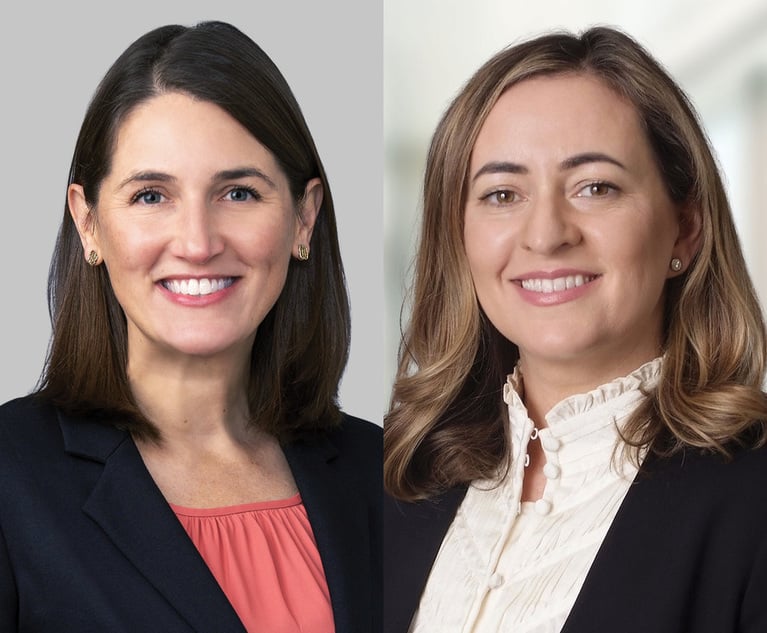Morrison & Foerster Posts Double-Digit Revenue Growth
The firm also reported growth in profits and increased its head count, exceeding 1,000 lawyers.
January 29, 2020 at 04:30 PM
5 minute read
 Photo: Jason Doiy/ALM |
Photo: Jason Doiy/ALM |Morrison & Foerster reported a double-digit increase in gross revenue, aided by strong growth in the firm's new Boston and Miami offices, as well as transnational work for large corporate clients Sprint and SoftBank.
Firm revenue increased 10% in the last fiscal year, from $1.04 billion to $1.15 billion. Revenue per lawyer saw a single-digit increase of 4%, from $1.09 million to $1.14 million as did average partner compensation, which grew 4.9% to roughly $1.5 million, compared to $1.43 million a year earlier, according to ALM data.
Profits per equity partner grew 3.3% to $2.05 million, signifying the first time the firm has surpassed the $2 million mark.
"Our 2019 performance comes on the heels of two prior exceptional years," said Larren Nashelsky, the firm's New York-based chairman.
The increase in PEP comes a year after the firm posted a staggering increase in PEP of 14%. That double-digit increase stemmed from a change in compensation, which dropped the firm's equity partner head count by 25% and increased its nonequity partner ranks by 50%.
But the surge in the firm's nonequity partnership appears to have subsided. Morrison & Foerster lost one nonequity partner in 2019 and added 14 equity partners. The firm said its total partner head count is composed of 128 nonequity partners and 181 equity partners in 2019.
Nashelsky said the change in the equity partnership numbers was not part of any overall plan.
 "I don't know that it was a conscious strategy. We really are recruiting the best and the brightest. In some years they fall more in one category than the other," Nashelsky said.
"I don't know that it was a conscious strategy. We really are recruiting the best and the brightest. In some years they fall more in one category than the other," Nashelsky said.
Morrison & Foerster closed several key matters last year, including serving as lead counsel for Sprint in its merger with T-Mobile, which was green-lighted by the U.S. Department of Justice in July; advising on Salesforce's $15.7 billion acquisition of analytics platform Tableau Software alongside Wachtell, Lipton, Rosen & Katz; and working with SoftBank as its go-to counsel amid a billion-dollar spending spree across the world.
In 2019, Morrison & Foerster broke the 1,000 head count mark, which grew from 951 to 1,005. It hired 42 lateral partners and opened two offices. Its new Boston office, which opened in February of last year, has grown to roughly 40 attorneys, including notable pick-ups such as Proskauer Rose corporate partner Ori Solomon and Todd Boudreau, former co-chair of Foley & Lardner's private funds and buyout practice.
The new Miami office launched in June as it poached nine Greenberg Traurig attorneys, including Greenberg's Miami corporate co-chair Randy Bullard, who made the jump to help serve firm client SoftBank. Since their move, Bullard and his team have advised on several SoftBank deals, with the latest being a $125 million Series B investment into Latin American fintech company AlphaCredit.
Other notable laterals include Chris Kandel, Latham & Watkins' banking co-chair who jumped over to Morrison & Foerster's London office in February; Jina Choi, who had led the U.S. Securities and Exchange Commission's San Francisco regional office; and former Mintz, Levin, Cohn, Ferris, Glovsky and Popeo partner Bethany Hills.
Morrison & Foerster did take some dings throughout the year. The firm lost four corporate partners to King & Spalding just before it shuttered its Northern Virginia office. The firm is also still facing a class-action "mommy-track" lawsuit filed on behalf of current or former employees who allege that the firm denied them advancement because of their pregnancies. Although the firm reached undisclosed settlements with five of the seven Jane Does, two are proceeding with their case. Morrison & Foerster has repeatedly denied the allegations.
Nashelsky said the firm is proud to have promoted 18 partners in 2020, eight of whom are women. He also noted that women co-chair or chair 20 practice groups within the firm.
Nashelsky said the firm is keeping an eye on potential changes to rules governing nonlawyer ownership and outside investment in law firms that are under review in the firm's home state of California. But the firm is "completely focused on being a law firm owned by its partners," he said.
"We made a growth in head count and talent, and growth in revenue and clients, which is evidence that the model is healthy," he added. "We don't see any changes in the short term."
|
Read More:
Partner Compensation Changes at Morrison & Foerster Lead to Equity Partner Drop, PEP Surge
This content has been archived. It is available through our partners, LexisNexis® and Bloomberg Law.
To view this content, please continue to their sites.
Not a Lexis Subscriber?
Subscribe Now
Not a Bloomberg Law Subscriber?
Subscribe Now
NOT FOR REPRINT
© 2024 ALM Global, LLC, All Rights Reserved. Request academic re-use from www.copyright.com. All other uses, submit a request to [email protected]. For more information visit Asset & Logo Licensing.
You Might Like
View All
'Rethink Everything' or 'Optimize What's Working'? The Right Law Firm Strategy
7 minute read
'Never Been More Dynamic': Big Law Leaders Reflect on 2024 and Expectations Next Year
7 minute read

T14 Sees Black, Hispanic Law Student Representation Decline Following End of Affirmative Action
Law Firms Mentioned
Trending Stories
- 1Deviation From Shared Custody Guidelines Requires More Than Common Sense
- 2Florida Pursues New Charge Against Trump Assassination Suspect
- 3Telefónica Maintains State Court Win in $623M Failed Merger Dispute
- 4‘Badge of Honor’: SEC Targets CyberKongz in Token Registration Dispute
- 55 Longtime Broward County Judges Set to Retire by End of 2024
Who Got The Work
Michael G. Bongiorno, Andrew Scott Dulberg and Elizabeth E. Driscoll from Wilmer Cutler Pickering Hale and Dorr have stepped in to represent Symbotic Inc., an A.I.-enabled technology platform that focuses on increasing supply chain efficiency, and other defendants in a pending shareholder derivative lawsuit. The case, filed Oct. 2 in Massachusetts District Court by the Brown Law Firm on behalf of Stephen Austen, accuses certain officers and directors of misleading investors in regard to Symbotic's potential for margin growth by failing to disclose that the company was not equipped to timely deploy its systems or manage expenses through project delays. The case, assigned to U.S. District Judge Nathaniel M. Gorton, is 1:24-cv-12522, Austen v. Cohen et al.
Who Got The Work
Edmund Polubinski and Marie Killmond of Davis Polk & Wardwell have entered appearances for data platform software development company MongoDB and other defendants in a pending shareholder derivative lawsuit. The action, filed Oct. 7 in New York Southern District Court by the Brown Law Firm, accuses the company's directors and/or officers of falsely expressing confidence in the company’s restructuring of its sales incentive plan and downplaying the severity of decreases in its upfront commitments. The case is 1:24-cv-07594, Roy v. Ittycheria et al.
Who Got The Work
Amy O. Bruchs and Kurt F. Ellison of Michael Best & Friedrich have entered appearances for Epic Systems Corp. in a pending employment discrimination lawsuit. The suit was filed Sept. 7 in Wisconsin Western District Court by Levine Eisberner LLC and Siri & Glimstad on behalf of a project manager who claims that he was wrongfully terminated after applying for a religious exemption to the defendant's COVID-19 vaccine mandate. The case, assigned to U.S. Magistrate Judge Anita Marie Boor, is 3:24-cv-00630, Secker, Nathan v. Epic Systems Corporation.
Who Got The Work
David X. Sullivan, Thomas J. Finn and Gregory A. Hall from McCarter & English have entered appearances for Sunrun Installation Services in a pending civil rights lawsuit. The complaint was filed Sept. 4 in Connecticut District Court by attorney Robert M. Berke on behalf of former employee George Edward Steins, who was arrested and charged with employing an unregistered home improvement salesperson. The complaint alleges that had Sunrun informed the Connecticut Department of Consumer Protection that the plaintiff's employment had ended in 2017 and that he no longer held Sunrun's home improvement contractor license, he would not have been hit with charges, which were dismissed in May 2024. The case, assigned to U.S. District Judge Jeffrey A. Meyer, is 3:24-cv-01423, Steins v. Sunrun, Inc. et al.
Who Got The Work
Greenberg Traurig shareholder Joshua L. Raskin has entered an appearance for boohoo.com UK Ltd. in a pending patent infringement lawsuit. The suit, filed Sept. 3 in Texas Eastern District Court by Rozier Hardt McDonough on behalf of Alto Dynamics, asserts five patents related to an online shopping platform. The case, assigned to U.S. District Judge Rodney Gilstrap, is 2:24-cv-00719, Alto Dynamics, LLC v. boohoo.com UK Limited.
Featured Firms
Law Offices of Gary Martin Hays & Associates, P.C.
(470) 294-1674
Law Offices of Mark E. Salomone
(857) 444-6468
Smith & Hassler
(713) 739-1250










